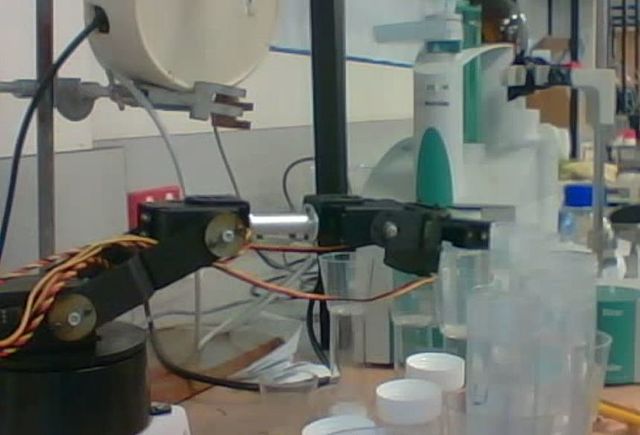97 million for the first autonomous robot lab in the world
-
 Robotarm die samples neemt (afbeelding ter illustratie). Foto: Wikimedia Commons
Robotarm die samples neemt (afbeelding ter illustratie). Foto: Wikimedia Commons
Scientists who want to build a fully automatic robot lab received a grant of 97 million euros from the National Growth Fund earlier this month. The lab is being built in cooperation with Fontys Hogeschool Eindhoven and lead by Wilhelm Huck, professor in physical-organic chemistry at Radboud University.
Imagine: there is no scientist to be seen, but the research in the lab continues unimpeded. Completely on their own, smart machine are mixing, weighing, and pipetting. An automatic microscope looks at chemical substances by itself, while a robotic arm readies the next experiment. Some distance further, a mobile robot delivers the needed chemicals. At the moment, these are visions of the future, but using the subsidy from the National Growth Fund, Wilhelm Huck wants to build such a robot lab on the business park of Novio Tech Campus. ‘The future of chemistry,’ he calls it.
Huck and his colleagues are going all-in on a combination of automation and artificial intelligence. The advantage of robots is that they can do a huge number of experiments, after which scientists can use the data from those experiments to train algorithms. In time, the algorithms will be able to understand complex chemical processes better than chemists themselves. Eventually, a kind of closed circle should emerge, Huck explains. Machines communicate with each other, perform experiments, analyse the results and, based on the results, initiate a new series of experiments.
Unique
The robot lab would be unique in its kind. Scientists in a number of places around the world are already using robots in chemical laboratories, but according to Huck, this automation is mainly intended to speed up standard steps in experiments. ‘Of course, we want that too, so we will also use these solutions. But a laboratory that functions completely autonomously is not available anywhere in the world – we will be the first to build one.’
Huck expects the robot lab to revolutionise molecular chemistry. ‘The way we do molecular research has hardly changed in the last hundred years. It’s a very labour-intensive process in which you try to make progress step by step each time.’ A robot lab that can generate enormous amounts of data should now speed up that process. ‘In such a lab we can do research that we can’t even dream of right now, because it’s simply not possible.’
Think of research into life itself. Billions of years ago, it started with a complex soup of molecules. ‘We have no idea how life ultimately arose from that,’ says Huck. ‘We know what molecules were there, but not what processes caused those molecules to evolve into living things.’ The hope is that the robot lab will bring that knowledge within reach. ‘If you have a fully functioning robot lab, you can study untold chemical processes. So much so that you might make discoveries about the chemical evolution that brought the molecule soup to life.’
Climate
The National Growth Fund, for which the government has set aside 20 billion euros between 2021 and 2025, was created to promote economic growth. The robot lab should also stimulate the economy in the long term. ‘I think science contributes to that anyway,’ says Huck, ‘but in the government’s economic models there is no automatic “button” to indicate the value of scientific research. So it is important that scientific knowledge is used in business. That is why we will soon open up the robot lab for use by all kinds of different companies.’
He hopes that companies will use the robot lab to develop green, energy-efficient products. The lab could accelerate that development. ‘Think of how many years it took to remove organic solvents from paint,’ says Huck by way of example. ‘Everyone wanted to get rid of those solvents, but then you wouldn’t have good paint anymore. It took a very long time before we found paint of the same quality but without organic solvents.’ If you use a smart, fully automated lab, you can find that kind of solution much faster. ‘Then, of course, you have enormous added value. That may not be in tangible things, but in the protection of the climate.’
National Growth Fund
Radboud spokesperson Martijn Gerritsen cannot recall a grant worth 97 million euros being awarded to a research project led by Radboud University before. Other acadamic institutes, such as Fontys University of Applied Sciences Eindhoven, Eindhoven University of Technology, the AMOLF Institute and Groningen University, are also involved in the research. The robot lab is one of 28 projects that received a grant from the National Growth Fund earlier this month. In this second round of investments, the cabinet has set aside 5 billion euros for projects that should stimulate the economy in the long term. Another 1.3 billion has been reserved for projects that may qualify.
Translated by Jan Scholten.




